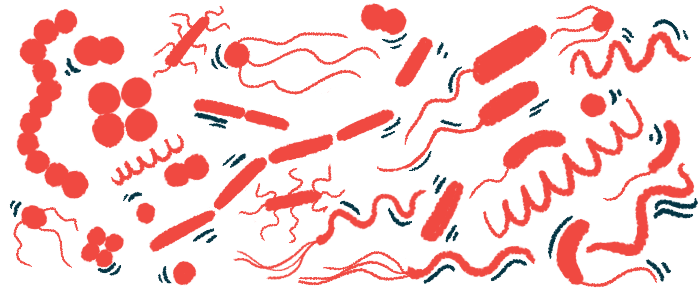Certain gut bacteria may influence disease risk in AS, study finds
Some bacteria linked to protective benefit, others to causal effect

Certain gut bacteria may influence disease risk in ankylosing spondylitis (AS), with some bacteria associated with a protective effect against its development and others with a causal effect.
These are the findings of a new study from China that analyzed genetic variants linked to different groups of gut bacteria and any possible associations with AS. The results suggest potential new therapeutic targets for treating or monitoring the disease, according to the researchers.
“Our study [provides] a new exploration direction for the treatment of AS,” the team wrote.
The study, “Causal relationship between gut microbiota and ankylosing spondylitis and potential mediating role of inflammatory cytokines: A mendelian randomization study,” was published in PLOS One.
5 gut bacteria types tied to AS disease risk
Increasing evidence suggests that changes in gut bacteria may be linked to axial spondyloarthritis, a group of inflammatory conditions that includes AS, which mainly affects the joints connecting the pelvis with the base of the spine.
While several studies have shown that ankylosing spondylitis patients have a distinct profile of gut bacteria relative to healthy people, it remains unclear whether these changes in gut bacteria cause AS or are a consequence of the disease.
To determine the direction of this link, a team led by researchers at Tianjin Hospital in northeastern China used a method called Mendelian randomization, which uses genetic information to identify potential cause-and-effect relationships between an exposure and an outcome.
Genetic data were collected from genome-wide association studies (GWAS), which are designed to detect associations between genetic variants and a certain trait or disease. These studies, providing genetic markers of either certain gut bacteria or AS development, covered tens of thousands of people.
The team first looked specifically at genetic markers linked to higher amounts of each of 211 groups of gut bacteria, to use them as proxies of actual abundances of gut bacteria. Then, they used these genetic variants as a person’s exposure and evaluated its potential link with the outcome: genetically predicted AS development.
The researchers found that some groups of gut bacteria may protect against AS, whereas others may increase the risk of developing the disease. Genetically predicted higher abundance of Lactobacillaceae, Rikenellaceae, and Howardella bacteria were significantly linked to a genetically predicted lower AS risk. Meanwhile, having more Actinobacteria and Ruminococcaceae_NK4A214 were linked to a higher risk.
When the researchers used genetic variants associated with a higher risk of AS as the exposure and genetically predicted higher abundance of certain gut bacteria as the outcome, they found no cause-and-effect relationship.
These findings indicate that having more of certain gut bacteria may contribute to AS development, and not the other way around, the team noted.
[Five specific gut bacteria identified in this study could] become new therapeutic targets and monitoring indicators for AS.
Given the thought that an infection of the digestive system may trigger inflammation in people genetically predisposed to AS, the researchers then conducted a similar analysis between gut bacteria and inflammatory molecules.
Having genetically predicted higher abundance of Actinobacteria in the gut was found to be significantly associated with higher levels of two pro-inflammatory molecules, IL-23 and IFN-gamma, as predicted by genetics.
This suggests that higher levels of these molecules could be part of the process by which gut bacteria lead to AS, though the exact mechanisms remain unclear.
While more studies are needed, the five gut bacteria identified in this work could “become new therapeutic targets and monitoring indicators for AS,” the researchers concluded.






